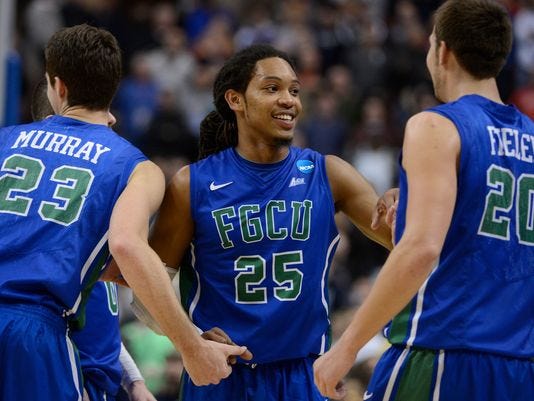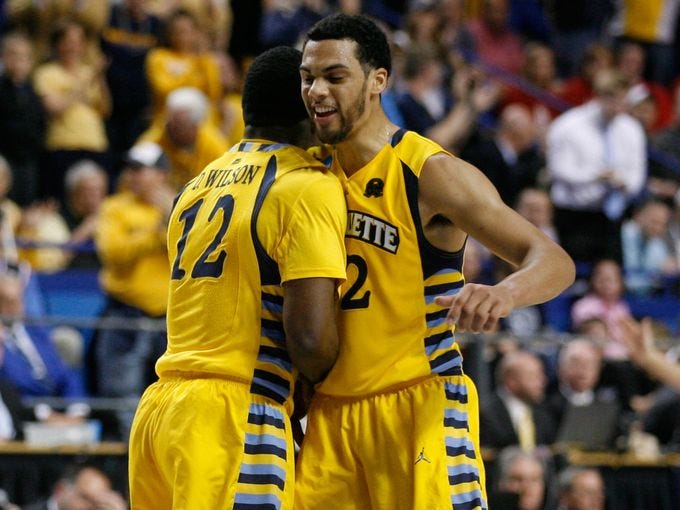
Florida Gulf Coast forward Eddie Murray, left, guard Sherwood Brown, center, and forward Chase Fieler celebrate during final moments of their win over Georgetown in the second round at the Wells Fargo Center. (Photo: Eileen Blass, USA TODAY Sports) FT. MYERS, Fla. -- Andy Enfield is a refreshing antidote to the Bob Knight coaching wannabes in the sometimes-sullied ranks of modern-day men's college basketball coaches. The young, prematurely graying coach with a Division III shooting record, an MBA in finance and an impressive NBA portfolio does not rant, rave or pontificate. During games, Enfield's tie remains perfectly knotted. Better yet, his Florida Gulf Coast University team scoops up victories like seashells on nearby Sanibel Island — and it does so in a spectacular fashion that sometimes leaves the second-year coach speechless. EXPERTS TAKE: Previewing the Sweet 16 games "We don't take ourselves too seriously here," Enfield, 43, tells USA TODAY Sports in his cramped office at the southwest Florida school that includes a beach and multiple lakes. "There were times last week (during the NCAA Tournament in Philadelphia) when I sat back and didn't have to say too much. I said to myself, 'Wow — this is fun to watch.' I was entertained by my own team. Pretty cool." Enfield's Eagles, streaking through the college basketball universe as a rim-rattling, mid-major comet this spring, are the stars of the tournament — a Sweet 16 finalist as a lowly No. 15 seed, a first. "The nation has fallen in love with their style of play," says Bill Nelson, who was Enfield's coach at Johns Hopkins. "If you're in the arena, you're out of your seat. If you're home, you're jumping off your couch. He is able to do what a lot of coaches can't do — he doesn't pull the reigns back. He isn't afraid." TOURNEY FLASHBACK: What happened in the first three rounds? The Eagles' electric style has vaulted them into the national conversation, not too shabby for a Division I program that has been in existence only since the 2007-08 season. The school opened its doors 16 years ago on a 760-acre campus that looks more like a nature preserve. The subtropical-style campus is as unique as, well, the basketball team's march to madness in only the school's second season of post-season eligibility. The Eagles (26-10) have won 14 of their last 16. Their record last season: 15-17. "Surreal," says senior forward Eddie Murray. "Four days ago, nobody knew who we were or where we were. In a couple of days, we won over Philadelphia. Now we've won over the nation." Friday, Florida Gulf Coast challenges big-cousin Florida in Arlington, Texas. The Gators, seeded third, are ranked 12th in the nation. The matchup is particularly intriguing because Enfield recruited several Gators players during his five seasons as an assistant coach at Florida State, where he left in 2011 to take the Eagles' job — at a hefty pay cut. The master recruiter signed a five-year contract that pays a peer-paltry $152,500 per season with potential $5,000 raises each year. Of course, Enfield is savvy enough to realize that those sums are lost-in-the-couch change for many Division I head basketball coaches. He is not sorry. He is more about high risk, high reward, which mirrors his team's style of play. "I didn't take this job for the money — I do it because I love the game and not for financial reasons," says Enfield, who's married to a former supermodel. "I took a pay (reduction) to leave the NBA for Florida State. And I took a huge pay cut from the business world to go into coaching. So I'm working my way down." Enfield laughs. While he doesn't say so, he realizes considerable financial remuneration awaits him down the road, probably at another school. Despite a career path that includes making good money in private business between coaching jobs, he is adamant about one thing: "Basketball is what I enjoy; this is what the future is." PHOTOS: TEAMS IN THE SWEET 16 As with many in his profession, Enfield is a coaching amalgamation arising from those who influenced him the most. From Mike Dunleavy, then coaching the Milwaukee Bucks, Enfield learned basic pro-style sets, putting his best players in position to score quickly. Enfield studied Rick Pitino's motivational techniques, personality and charisma with the Boston Celtics. "Everyone knows he's a great basketball coach but I learned more than Xs and Os," he says. From Leonard Hamilton at Florida State, the Eagles' coach "learned how to build a program." But Enfield adds: "This is my system here," rapping his knuckles on his desk for emphasis. "I've taken a lot from each but this system is not the same (as theirs). I'm not saying it's unique, but I made the decision that this is how I want it to be. This is how I want to coach." CINDERELLA WATCH: Which team pulls off the upset? Of course, Nelson at Johns Hopkins and Enfield's father, Bill, a former high school coach in Shippensburg, Pa., also made an impact. "I'm more nervous before the game than during the game," says his father, 72, who will attend Friday's matchup with wife Barbara. "The players are like a family — they enjoy playing with each other. You don't see it that often at that level." "My father was a big influence in how I view the game," says his son. While a grad student at Maryland, he noticed that former Terrapins star Walt Williams was a great scorer but not a lights-out shooter. Enfield would know: he shot an NCAA free-throw record 92.5% at Hopkins and graduated in 1991 as the school's all-time leading scorer and as an academic All- American. Enfield's entrepreneurial spirit was evident as soon as he walked out of College Park, Md., with a 3.9 grade-point average in Maryland's graduate business program. One day, he decided to get Williams' attention. Enfield started swishing three-pointers — not merely from beyond the arc but from out of bounds. Eventually, Williams became a client. Before long, Enfield had established a lucrative business, "All Net Basketball." As a shooting consultant, he produced videos of the game's finer offensive points. He served in a similar team capacity with the Celtics and Bucks in the mid-to-late 1990s. "I'm thinking, 'Well, shoot, if this guy can get 100 people in the NBA to pay him, imagine if he has a college scholarship (to give),' " says Eagles athletic director Ken Kavanagh. "He just exudes confidence, which I felt was very important to recruiting. We needed someone with self-confidence to get into our community to be a fund-raiser." THE UPSET RECIPE: The anatomy behind FGCU's 'dunk city' offense Despite the Eagles' 15-1 home-record this season, attendance averaged only 2,200 in the 4,000-plus seat Alico Arena. The crucial moment of hiring their coach was just the beginning for Enfield, whose players are a reflection of their coach. "The thing we like about Coach Enfield is that he is very laid-back," said senior guard Sherwood Brown, the Atlantic Sun Conference player of the year. "There's not too much that gets up under his skin. He really expects one thing from his players — play hard." As the tournament field shrinks, the coach doesn't his expect his players' collars to do likewise. Pressure, what pressure? Enfield and the Eagles are playing with house money. Besides, it's nothing like the anxiety he experienced during his first week as FGCU coach two years ago. "I definitely remember it,' smiles his wife, Amanda Enfield, a former cover girl for Maxim and other magazines. She gave up her career when her husband took the Florida State job in 2006. They have three children, including daughters Aila, 6, and Lilly, 5 and son Marcum. Regarding that rather stressful day in the spring of 2011, Amanda remembers it being, "crunch-time for recruiting." "I just happened to be giving birth to our son at the time," she says. As nurses prepped her for a C-section delivery of Marcum, her husband, on the phone, created a little too much commotion as he sat next to the hospital bed trying to play catch-up with recruiting prospects. "I was having trouble hearing the nurses so I told him, 'OK, it's time for you to get off the phone. I am about to be cut open here,'" Amanda recalls with a chuckle. "He got off the phone." She adds, "He was a great sport through the delivery. Pretty much after he found out the baby was healthy and I was fine he went back to work." Her husband laughs when he thinks about his laser-intensity that day. The coach knew he had a major selling job because of the school's low profile. The first time Enfield noticed that there might be an identity crisis for FGCU came that first week as he and his staff contacted parents and recruits to restock the roster with the type of speedy, long-limbed, athletic players his up-tempo system requires. Many recruits thought Enfield was calling from a junior college — specifically, Gulf Coast Community College in Panama City, Fla. Enfield calming repeating that, no, Florida Gulf Coast University was Division I. "It took quite a few months to build our name-recognition within the state, and even longer throughout the East Coast, in recruiting circles," Enfield says. "No one knew who we were." In some cases, they still don't. Last Sunday, San Diego State coach Steve Fisher shot a verbal air ball when, moments after his Aztecs were vanquished 81-71 in the round of 32, he called the Eagles something that boarded on in-state heresy — Florida State. TBS televised a score for an Eagles' tournament game as "Florida Golf Coast." "I know the administration cares more about that than I do — I just kind of laugh at it," Enfield says. "I tell them, 'We just need to win. Then everyone will figure it out.' " MARCH SADNESS: TEAMS ON THE LOSING END OF NCAA ACTION Story Highlights
















Like this topic? You may also like these photo galleries:























